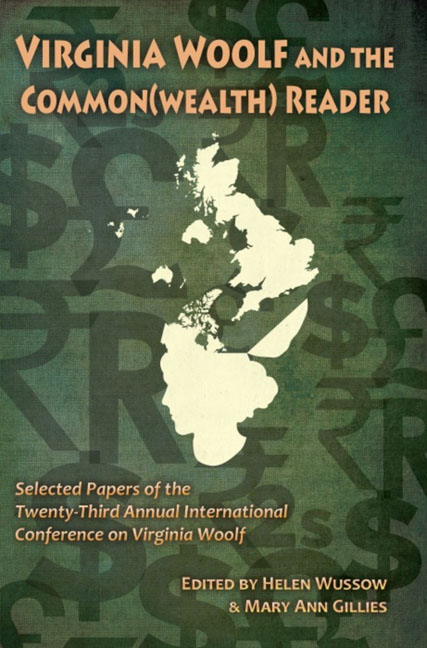Book contents
- Frontmatter
- Contents
- Introduction to Virginia Woolf and the Common(wealth) Reader
- Acknowledgments
- List of Abbreviations
- Invocations
- Networks of Affiliation: Foundations and Friends
- Woolf and the Commonwealth
- 1930s Onwards
- Woolf Beyond the Book
- Preserving Our History of Reading Woolf: The Common Wealth of Our Past and Future
- Adventures in Common: Investing with Woolfs and ”Securitas”
- Printing “Prelude”: Virginia Woolf's Typsetting Apprenticeship and Katherine Mansfield on “Other People's Presses”
- The Hogarth Press, Digital Humanities, and Collaboration: Introducing the Modernist Archives Publishing Project (MAPP)
- Woolf Blogging, Blogging Woolf: Using the Web to Create a Common Wealth of Global Scholars-Readers
- Notes on Contributors
- Conference Program
The Hogarth Press, Digital Humanities, and Collaboration: Introducing the Modernist Archives Publishing Project (MAPP)
from Woolf Beyond the Book
- Frontmatter
- Contents
- Introduction to Virginia Woolf and the Common(wealth) Reader
- Acknowledgments
- List of Abbreviations
- Invocations
- Networks of Affiliation: Foundations and Friends
- Woolf and the Commonwealth
- 1930s Onwards
- Woolf Beyond the Book
- Preserving Our History of Reading Woolf: The Common Wealth of Our Past and Future
- Adventures in Common: Investing with Woolfs and ”Securitas”
- Printing “Prelude”: Virginia Woolf's Typsetting Apprenticeship and Katherine Mansfield on “Other People's Presses”
- The Hogarth Press, Digital Humanities, and Collaboration: Introducing the Modernist Archives Publishing Project (MAPP)
- Woolf Blogging, Blogging Woolf: Using the Web to Create a Common Wealth of Global Scholars-Readers
- Notes on Contributors
- Conference Program
Summary
Origins
The impetus for this international, digital project on the history of modernist publishing arose from each collaborator's confrontation with research barriers. In working on various aspects of Woolf's publication history and/or the history of modernist publishing, we faced the problems of archival dispersal, the vast scope of material, and the lack of any comprehensive book historical account of modernist publishing to orient or contextualize our findings. The Modernist Archives Publishing Project (MAPP) was born in collective response to these barriers with the aim of using digital technology to create a “super collection” of books and publishing histories that empirically models theories in book history and literary sociology about the cultural production of texts in the twentieth and twenty-first centuries. The Hogarth Press, with two famous in-house writers, varied list, strategic marketing, and international reach, offers an ideal pilot study to inaugurate MAPP.
No single scholar can assimilate or adjudicate in isolation the holdings or intricate narrative history of The Hogarth Press, which published over five hundred books during the Woolfs’ stewardship up to 1946, and then another five hundred under the aegis first of Chatto & Windus (up to 1987) and then Random House (1987 to present). Digitizing, annotating, and reconfiguring the network relations amongst these diverse texts within the wider public sphere of modernist publishing is where MAPP aims to make a key intervention. It positions The Hogarth Press as both case study and catalyst to a broader understanding of how publishing houses as creative and business enterprises shaped the modernist movement and the discourses of twentieth-century culture. Our goal is to digitally reanimate the network history of publishing.
For those interested in Woolf, MAPP will enable scholars to trace the evolution of Woolf's writing practice alongside her work as editor, to ask new questions in the context of her editorial practice about contested theories within modernist studies—autonomy, professionalism, ethics, cosmopolitanism, gender, genre—and to rethink the construction of Woolf's privileged space as canonical modernist within the cultural field.
- Type
- Chapter
- Information
- Virginia Woolf and the Common(wealth) Reader , pp. 223 - 231Publisher: Liverpool University PressPrint publication year: 2014



